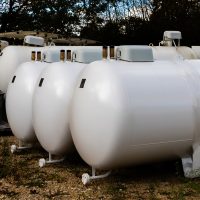NJDEP’s Jurisdiction Over Underground Storage Tanks in New Jersey

The New Jersey Department of Environmental Protection (NJDEP) plays a critical role in overseeing the safe installation, operation, and closure of Underground Storage Tanks (USTs) in the state. With both federal and state mandates guiding its authority, the NJDEP ensures that UST systems throughout the Garden State comply with rules designed to protect people, property, and the environment. Here’s how their jurisdiction operates and what it means for UST owners and operators. For help with UST installation, removal or servicing in New Jersey, contact the professionals at Herbert Lutz & Company, providing storage tank services in New Jersey for over 100 years.
1. Governing Authorities: State & Federal
New Jersey implements its UST regulations under N.J.A.C. 7:14B, which mirrors and in some cases expands on federal UST rules under 40 CFR Part 280. These standards govern every aspect of UST systems from design and installation to testing, closure, and remediation.
Under this framework, NJDEP’s Bureau of Underground Storage Tanks Compliance and Enforcement carries out a wide range of responsibilities:
- Facilitating registration and renewal of USTs
- Enforcing performance, monitoring, and release detection rules
- Handling release reporting and investigation, out-of-service procedures, closure, contractor certification, and financial responsibility mandates.
2. What Counts as a “Regulated UST”?
Not every tank buried underground falls under NJDEP regulation. The agency distinguishes between regulated and unregulated USTs:
Regulated USTs typically include those used for commercial purposes, e.g., tanks storing gasoline, diesel, waste oil, or other hazardous substances, or used in offsite distribution or sale.
Unregulated USTs are generally limited to small, residential-use heating oil tanks under certain capacities, or farm-use fuel tanks below a threshold. Specifically, unregulated USTs in New Jersey include residential heating oil tanks of any size, non-residential heating oil tanks up to 2,000 gallons, and farm or residential motor fuel use tanks up to 1,100 gallons.
Despite being unregulated for day-to-day UST rules, these tanks must still be reported, especially if leaking, and may involve Remediation or a Licensed Site Remediation Professional (LSRP).
3. Permitting, Registration & Notifications
For regulated USTs, NJDEP requires formal registration. Owners and operators must submit the Underground Storage Tank Facility Certification Questionnaire, which includes facility identification details, owner and operator information, tank specifications, financial assurance documentation, and installer certification, if required.
Since December 2, 2024, all UST-related submissions, such as initial registration, renewals, modifications, and financial assurance updates, must be submitted online via the NJDEP portal.
4. Compliance, Inspections & Enforcement
NJDEP maintains oversight through a mix of compliance assistance and enforcement actions. Their activities include performing facility inspections, investigating UST-related complaints or releases, verifying certification of contractors and operators, and issuing enforcement orders, penalties, or return-to-compliance schedules.
5. Closure & Remediation Protocols
When a UST is decommissioned or no longer in use, NJDEP requires proper closure, either via removal or abandonment in place. Regulated closures demand notification to NJDEP and submission of a closure plan. Often, engagement with an LSRP to oversee remediation and documentation is required as well. Even unregulated tanks must follow proper protocols when leaking or closed and may still trigger reporting requirements and professional oversight.
Why This Matters to You
Understanding NJDEP’s jurisdiction is critical to staying compliant and avoiding fines, delays, or environmental damage. Key takeaways for UST owners and operators include:
- Know your tank: Is it regulated under NJDEP rules or not?
- Stay registered and certified: Submit required forms, online or otherwise, and ensure financial responsibility is documented.
- Work with licensed professionals: Certified installers, LSRPs, and trained operators keep you aligned with regulations.
- Prepare for closure: Engage proper closure and remediation processes to finalize your obligations correctly.
Contact Herbert Lutz & Company for All Your UST Needs
NJDEP’s authority over USTs is comprehensive but clearly structured. Their reach spans regulated systems from registration to closure, with a clear path of compliance and enforcement. Whether you’re installing, operating, or decommissioning a UST, familiarity with these rules and access to qualified experts ensure both environmental safety and regulatory peace of mind.
For help with USTs in New Jersey from a team of qualified professionals, contact Herbert Lutz & Company.
